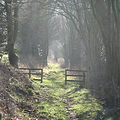The Land of "Should"
- Debbie Innes

- Jan 31, 2020
- 3 min read
I have a question for you. How many times have you visited the land of “SHOULD” today? What I mean by that is, how many times today have you started a thought or sentence with, “I should….”? Or how many times today did someone start a sentence to you with, “You should…”? That would be you at the border of the land of SHOULD. When you start to believe, in an uncritical way, whatever it was that ended those sentences, that’s when you’ve entered the land of “SHOULD.” Yes, sometimes it can be ok to visit – I debate this quite a bit with some of my friends. But, really, I’m not quite sure it’s a helpful place to live. Let me explain.

A long time ago, in my first semester of my counselling degree, we were introduced to the major counselling theorists and theories that had developed over time. The thing that stuck most in my memory from that class was one of videos we watched - a video of ‘experts’ doing counselling. In this specific video, the 'expert' counsellor says to client in exasperation, “You’re ‘shoulding’ all over yourself!” I was so struck by this statement, I wrote it down in my notebook. The counsellor was referring to the client’s use of the word should. He saw it as a cognitive distortion, or a thought or belief that influenced the client’s perception of reality in a negative way. From that day forward, my ears would perk up when anyone used the word ‘should’, though admittedly it took longer for me to notice when I used it in my own self-talk. But I began to see ‘should’ as a red flag of sorts. See, “should statements” (or ‘oughts’ or ‘musts’) generally indicate judgement. Even simple statements: “you should have cleaned your room”, “I should have arrived earlier”, “I should have worn a different sweater” imply that whatever you did do wasn’t right. There. Judged. And not only judged, but wrong.
Whether you say it to yourself or others or whether someone else is saying to themselves or others, if ‘shoulds’ are indicative of judgement, these kinds of statements are likely to bring about guilt or shame.
This is why I don’t think it’s a helpful place to be or a helpful thing to say. The debates I have with friends usually centre on moral issues – think of the 10 commandments. Thou shalt not kill. Well, ok. I shouldn’t kill. But is it the case that I should make a new year’s resolution or that I shouldn’t be upset when I feel scared? Especially when it comes to feelings, ‘should’ statements feel particularly unhelpful. Who says I shouldn’t feel the way I feel? Even if I don’t want to feel sad or anxious or scared, telling myself I shouldn’t feel those things doesn’t seem to stop me from feeling them. In fact, this article explains how ‘should’ statements contribute to anxiety and panic. They suggest reframing your ‘should’ statements into more compassionate statements. So, for instance, instead of getting upset as you keep telling yourself that you should be getting more done on your list of things to do, they suggest reframing that thought to something like, “I am doing what I can today. If there are things I can’t get to today, they will still be there tomorrow.”
So I’ll ask you again: How many times have you visited the land of “SHOULD” today? And has that been helpful? If not, the next time you find yourself telling yourself that you should be doing something you haven’t or feeling some particular way, try asking yourself two simple questions. The first is: “Really?” The other is: “Should I?” If nothing else, asking yourself these 2 simple questions will give you a moment to examine your expectations of yourself. Really? Is it realistic that I finish off my list of 20 things to do today? Really? Should I always have to feel happy about everything? Really? Can I not allow myself to trip up today? Really? Should I expect my yoga postures to be the same every day? Those questions might keep you at the border of the land of “SHOULD” and might even help you offer yourself a bit more kindness. And who doesn’t deserve that?




Comments